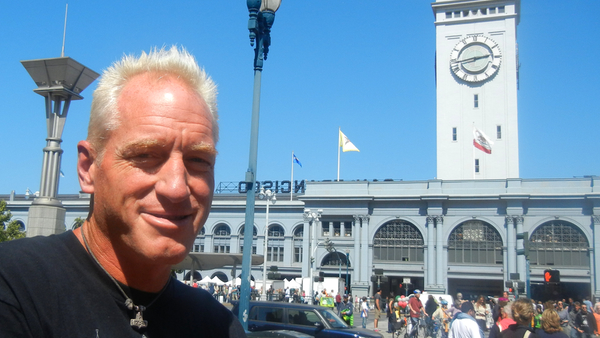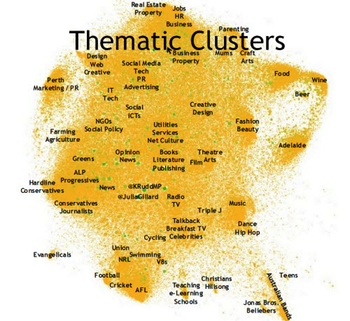 On Monday I’m delivering a guest lecture at the University of Technology Sydney. “Algorithms and the Filter Bubble” is the supplied title, and in theory I’ll be looking at Google (and friends), big data and personalised news filtering.
On Monday I’m delivering a guest lecture at the University of Technology Sydney. “Algorithms and the Filter Bubble” is the supplied title, and in theory I’ll be looking at Google (and friends), big data and personalised news filtering.
The students — who are, I’m told, “first and second year students who are at the beginning of their media studies degrees” — have been given some pre-reading: Eli Pariser’s book The filter bubble: what the Internet is hiding from you (specifically the chapter “The User is the Content”, pages 47-76 in the edition I’ve seen; check the Wikipedia summary), and David Beer’s paper “Power through the algorithm? Participatory web cultures and the technological unconscious”. I’m about to read them myself.
But I reckon the bleeding-edge action here is in advertising, not news, and especially the comprehensive data mining that allows, for example, Target in the US to figure out that a woman is pregnant just by her shopping list.
After I discussed these topics with the lecturer, I sent her a list of related material I’d written. I believe this has been sent to the students.
- The Facebook experiment, ZDNet Australia, 23 March 2012.
- Twitter mapping and how we choose our own adventure, Crikey, 23 May 2012. The illustration above shows some of the work I reported here, done by the ARC Centre of Excellence for Creative Industries and Innovation at the Queensland University of Technology in mapping the Australian political Twittersphere.
- PS4 socials all the gaming, says Sony; but why?, ZDNet Australia, 21 February 2013.
- Influence, vanity metrics and other internet astrology, ZDNet Australia, 14 February 2013.
- Users snap over Instagram, but should have seen it coming, Crikey, 19 December 2012.
- Aust businesses are losing in the big data era, one ‘Like’ button at a time, ZDNet Australia, 14 December 2012.
I also linked to my presentation at Consilium 2012: Social media is destroying society? Good!
Since then, ProPublica has posted an excellent article, Everything We Know About What Data Brokers Know About You.
I don’t know if non-students are allowed in, but the lecture is on Monday 25 March at 1300 AEDT in Room 56, Level 3, Building 6 (Peter Johnson Building), University of Technology Sydney, 702-730 Harris Street, Ultimo. In any event, I’ll be recording it and will post the audio and transcript here in due course.
For now, though, I suppose I should write the damn thing.
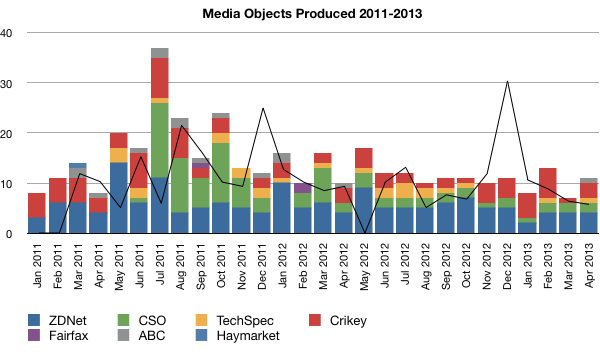

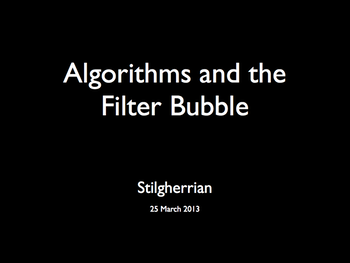 Here’s the guest lecture I delivered at the University of Technology Sydney on 25 March 2012, “Algorithms and the Filter Bubble”. Full audio and slides for now, a transcript to follow in the next few days.
Here’s the guest lecture I delivered at the University of Technology Sydney on 25 March 2012, “Algorithms and the Filter Bubble”. Full audio and slides for now, a transcript to follow in the next few days.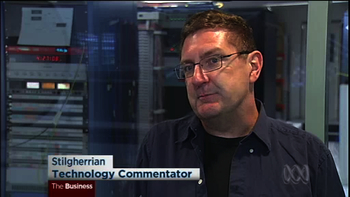 A strange thing happened yesterday. A distributed denial service (DDoS) attack, a big one, got reported in the mainstream media as having somehow all but crippled the internet — despite all the journalists presumably continuing to use the internet as usual.
A strange thing happened yesterday. A distributed denial service (DDoS) attack, a big one, got reported in the mainstream media as having somehow all but crippled the internet — despite all the journalists presumably continuing to use the internet as usual. The
The 